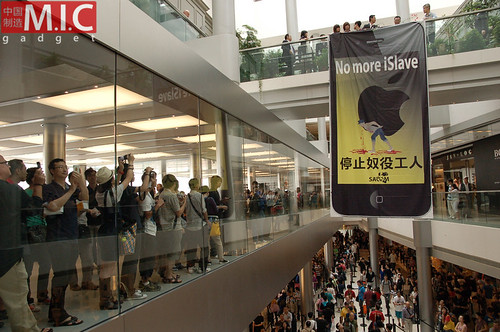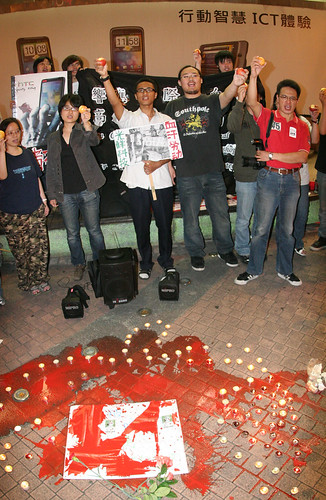Students & Scholars Against Corporate Misbehaviour
Telephone: (852) 2392 5464 Fax: (852) 2392 5463
Mailing Address: P.O.Box No. 79583, Mongkok Post Office, HONG KONG
Foxconn and Apple Fail to Fulfill Promises:
Predicaments of Workers after the Suicides
6 May 2011
Introduction
The series of suicides at Foxconn[1] in the first five months of 2010 seemed to have accelerated its relocation across all parts of China. One year on, the inland provincial governments compete with each other for Foxconn’s investment by offering concessions to the company. In the first round of competition, Zhengzhou of Henan Province has won the project among various interested cities, followed by Chengdu of Sichuan Province after rounds of negotiations. With strong governmental support, the workforce in Foxconn has grown to 1 million, a predominant majority of its workforce is young peasant-workers from the countryside. At recruitment talks, Foxconn paints a whole new rosy picture: high wages and good prospect. It looks like Foxconn might have reflected deeply upon its military management and low-cost production strategy, which had driven workers to despair. A number of Foxconn’s customers, notably Apple, HP and Dell, have also pledged to “work with Foxconn” to live up to higher international labour standards. A big question is how this hidden electronics supply chain really works. SACOM is interested to track the working conditions of the new Foxconn production sites to ascertain the workplace improvement in place, if any.
While Foxconn is moving to the inner part of China, Students & Scholars Against Corporate Misbehaviour (SACOM) is interested to track the working conditions of the new Foxconn production sites. In this spring, SACOM researchers visited two Foxconn production facilities in Chengdu and Chongqing municipality in Western China, where they are manufacturing Apple iPad 2 and HP laptops. We also revisited Foxconn’s flagship plants in two industrial towns, Longhua and Guanlan in the Shenzhen, where employees are still housed in dormitories surrounding with anti-suicide nets.
Factory profile:
| Shenzhen | Chengdu | Chongqing |
Campus | (1) Longhua and (2) Guanlan | (1) southern plant: Chengdu High-Tech Comprehensive Bonded Zone and (2) northern plant: Chengdu Import/Export Processing Zone | Xiyong Micro-electronics industrial park |
Estimated Workforce | 500,000 | 100,000 | 10,000 |
Client | Apple, HP, Nokia, Dell, etc. | Apple | HP mainly |
Product | computer, laptop, mobile phone, server, etc. | iPad | Laptop and network |
While Apple commends the measures taken by Foxconn to improve working conditions, SACOM finds predicaments of workers remain. Workers always have excessive and forced overtime in order to gain a higher wage. Workers are exposed to dust from construction site and shop floor without adequate protection. Even worse, they are threatened by potential harm of occupational diseases in various departments. Additionally, military-styled management is still in practice, characterized by “military training” for new workers.
Throughout the investigation, when researchers asked about the feeling of Foxconn workers about the hardship of workers, like low wages, potential harm of occupational diseases, work pressure and exhaustion, the typical answer is “I get used to that”. Despite of grievances from workers, workers feel it is helpless to bring changes. Therefore, they can only submit themselves to the rules and culture of Foxconn or resign. A couple of interviewees with whom SACOM is in contact with have left the factory within 1-3 months to seek better jobs. This reflects human management at Foxconn as merely a slogan.
Foxconn has primary responsibility in labour rights abuses. The clients, including Apple and HP, which declare decent working conditions at their suppliers have indispensible obligations to put their promise into practice. Taking labour rights violations in Chengdu are the most problematic, Apple, the sole buyer of Chengdu plant, must take actions to improve working conditions at Foxconn. SACOM’s international partners of the IT campaign, makeITfair and GoodElectronics network, designated May 7th as the global action day on Apple and Foxconn.[2] This report is part of the efforts to invite concerned consumers to voice out our aspiration of fair IT products from both Apple and Foxconn.
One year on: Apple and Foxconn promise unfulfilled
| Promise | Reality |
Recruitment and employment term | In strict compliance with law | Misleading statements (e.g. wages, benefits, and location of work) |
Wages | Across-the-board increase | miscalculation of wages; unpaid overtime work |
Work hours | Decrease from 80 hours OT a month to 36 hours overtime work a month | Routinely 80-100 hours overtime work a month; continuous shift which denies meal break |
Health & safety | Adequate personal protective equipment; health examination | Lack of protections; workers are not well informed about the chemicals in use |
Student workers | Length of internship regulated; skills training provided; underage workers protected (16-18 years of age) | Interns are de facto workers; on mandatory night shift |
Grievance mechanism | Better worker-management communication by launching hotline for workers | Workers cannot find effective ways to handle the grievances at workplace |
[1] The Taiwanese owned Foxconn Technology Group, a subsidy of Hon Hai Precision Industries Ltd., is the world’s leading electronics manufacturer. Foxconn ranked 112th among Global Fortune 500 Companies in 2010. Currently, Foxconn has a workforce of a million workers all over China.









